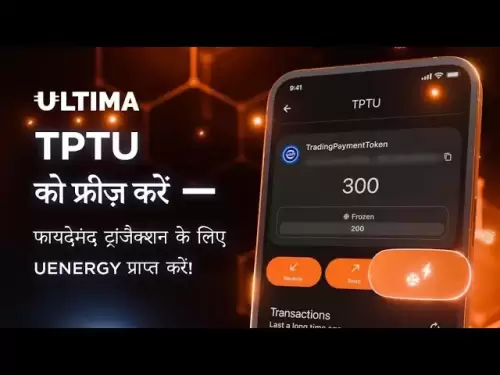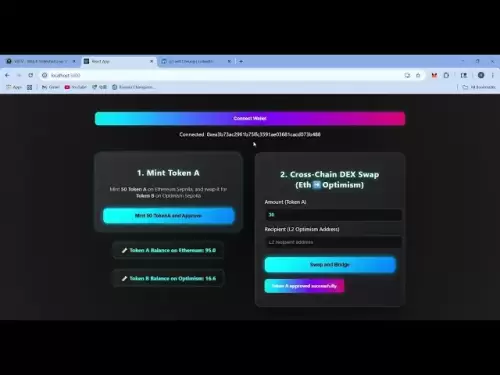-
 Bitcoin
Bitcoin $109,459.7682
2.44% -
 Ethereum
Ethereum $2,598.6052
6.29% -
 Tether USDt
Tether USDt $1.0003
0.00% -
 XRP
XRP $2.2734
3.95% -
 BNB
BNB $661.4886
1.58% -
 Solana
Solana $155.4825
4.35% -
 USDC
USDC $0.9999
-0.02% -
 TRON
TRON $0.2838
1.04% -
 Dogecoin
Dogecoin $0.1740
8.25% -
 Cardano
Cardano $0.6047
9.04% -
 Hyperliquid
Hyperliquid $40.2302
6.50% -
 Sui
Sui $2.9863
10.05% -
 Bitcoin Cash
Bitcoin Cash $509.5786
0.60% -
 Chainlink
Chainlink $13.8156
6.03% -
 UNUS SED LEO
UNUS SED LEO $9.0142
0.69% -
 Avalanche
Avalanche $19.0337
8.68% -
 Stellar
Stellar $0.2438
5.17% -
 Toncoin
Toncoin $2.9012
3.59% -
 Shiba Inu
Shiba Inu $0.0...01210
6.20% -
 Litecoin
Litecoin $90.0882
7.05% -
 Hedera
Hedera $0.1597
8.53% -
 Monero
Monero $326.3340
2.88% -
 Polkadot
Polkadot $3.6365
9.32% -
 Bitget Token
Bitget Token $4.6162
2.72% -
 Dai
Dai $1.0001
0.00% -
 Ethena USDe
Ethena USDe $1.0002
-0.01% -
 Uniswap
Uniswap $7.6403
10.47% -
 Pepe
Pepe $0.0...01060
12.03% -
 Aave
Aave $281.3664
7.56% -
 Pi
Pi $0.4992
1.76%
How are dYdX's trading fees calculated?
dYdX uses a maker-taker fee model: makers pay 0.00% and takers pay 0.05%. Also, consider Ethereum network fees and funding rates for perpetual contracts.
Apr 09, 2025 at 03:14 am
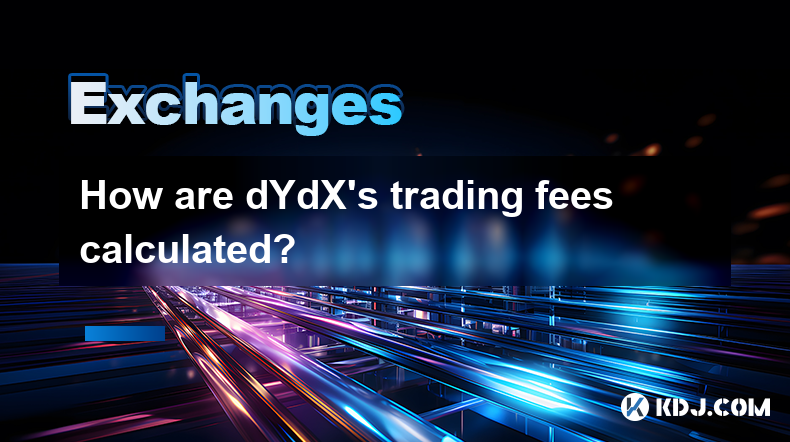
dYdX is a decentralized exchange that operates on the Ethereum blockchain, offering users the ability to trade perpetual contracts and other derivatives. One of the key aspects that users need to understand when using dYdX is how trading fees are calculated. This article will delve into the specifics of dYdX's fee structure, providing a comprehensive guide on how these fees are determined and applied.
Understanding dYdX's Fee Structure
dYdX employs a maker-taker fee model, which is common among many cryptocurrency exchanges. In this model, makers are users who place limit orders that add liquidity to the order book, while takers are users who place market orders that remove liquidity from the order book. The fees for makers and takers are different, reflecting their impact on the market's liquidity.
Maker Fees on dYdX
Maker fees on dYdX are typically lower than taker fees because makers contribute to the liquidity of the market. As of the latest data, the maker fee on dYdX is set at 0.00%. This means that if you place a limit order that does not immediately execute and instead adds to the order book, you will not be charged any fees for that order. This incentivizes users to provide liquidity to the platform.
Taker Fees on dYdX
In contrast, taker fees are charged when a user's order is executed immediately, taking liquidity away from the order book. The taker fee on dYdX is set at 0.05%. This fee is applied to the total value of the trade. For example, if you place a market order to buy $10,000 worth of a perpetual contract, you will be charged a fee of $5 (0.05% of $10,000).
Calculating Trading Fees on dYdX
To calculate the trading fees on dYdX, you need to determine whether your order is a maker or a taker order. Here's how you can do it:
- Identify the Order Type: If you are placing a limit order that does not immediately execute, it is a maker order. If you are placing a market order that executes immediately, it is a taker order.
- Calculate the Fee: For maker orders, the fee is 0.00%, so there is no fee to calculate. For taker orders, multiply the total value of your trade by 0.05%.
For example, if you want to buy $5,000 worth of a perpetual contract using a market order, the calculation would be as follows:
- Total Trade Value: $5,000
- Taker Fee Rate: 0.05%
- Taker Fee: $5,000 * 0.05% = $2.50
Additional Fees and Considerations
While the maker and taker fees are the primary fees on dYdX, there are other considerations to keep in mind:
- Network Fees: When trading on dYdX, you will also need to pay Ethereum network fees (gas fees) for transactions. These fees can vary based on network congestion and are not controlled by dYdX.
- Funding Rates: For perpetual contracts, dYdX uses a funding rate mechanism to ensure that the contract price stays aligned with the underlying asset's price. Funding rates can be positive or negative and are paid or received by traders holding positions.
How to View and Manage Fees on dYdX
To view and manage your fees on dYdX, follow these steps:
- Log into your dYdX account: Access your account on the dYdX platform.
- Navigate to the Trading Page: Go to the trading page where you can see your open orders and recent trades.
- Check the Order Details: For each order, you can see whether it is a maker or taker order and the associated fee.
- Review Your Transaction History: You can also review your transaction history to see all the fees you have paid over time.
Impact of Fees on Trading Strategy
Understanding how fees are calculated can significantly impact your trading strategy on dYdX. Here are some considerations:
- Liquidity Provision: Since maker orders do not incur fees, you might consider placing more limit orders to add liquidity to the market and avoid fees.
- Cost Management: For taker orders, the 0.05% fee can add up, especially for high-frequency traders. It's important to factor these costs into your trading decisions.
- Position Sizing: When calculating potential profits and losses, always include the impact of fees to get a more accurate picture of your trading performance.
Frequently Asked Questions
Q: Can I reduce my trading fees on dYdX?
A: Currently, dYdX does not offer a fee reduction program or a tiered fee structure based on trading volume. However, you can minimize your fees by using maker orders, which do not incur any fees.
Q: Are there any hidden fees on dYdX?
A: dYdX is transparent about its fee structure, and there are no hidden fees. The primary fees you will encounter are the taker fees and Ethereum network fees. Always review the transaction details to understand all associated costs.
Q: How do funding rates affect my trading fees on dYdX?
A: Funding rates are not considered trading fees but are an additional cost or benefit associated with holding perpetual contract positions. They are separate from the maker and taker fees and are calculated based on the difference between the perpetual contract price and the underlying asset's price.
Q: Can I see my total fees paid on dYdX over a specific period?
A: Yes, you can review your transaction history on dYdX to see all the fees you have paid over time. Navigate to your account's transaction history section to get a detailed breakdown of your fees.
Disclaimer:info@kdj.com
The information provided is not trading advice. kdj.com does not assume any responsibility for any investments made based on the information provided in this article. Cryptocurrencies are highly volatile and it is highly recommended that you invest with caution after thorough research!
If you believe that the content used on this website infringes your copyright, please contact us immediately (info@kdj.com) and we will delete it promptly.
- Eurau Stablecoin: Deutsche Bank, Galaxy, and Bafin Approval Usher in New Era
- 2025-07-03 20:30:12
- Solana DEX Volume and Ranking: Riding the Wave to the Top
- 2025-07-03 21:10:20
- BONK ETF Buzz: News, Catalysts, and What's Driving the Meme Coin Mania
- 2025-07-03 21:10:20
- Stablecoin Market: JPM's Forecast vs. Trillion-Dollar Potential—Reality Check?
- 2025-07-03 21:50:12
- Kane Brown Trades Country for Comedy: A Rom-Com Debut!
- 2025-07-03 21:50:12
- Check Your Change! That 1p Coin Could Be Worth £200k!
- 2025-07-03 21:20:17
Related knowledge
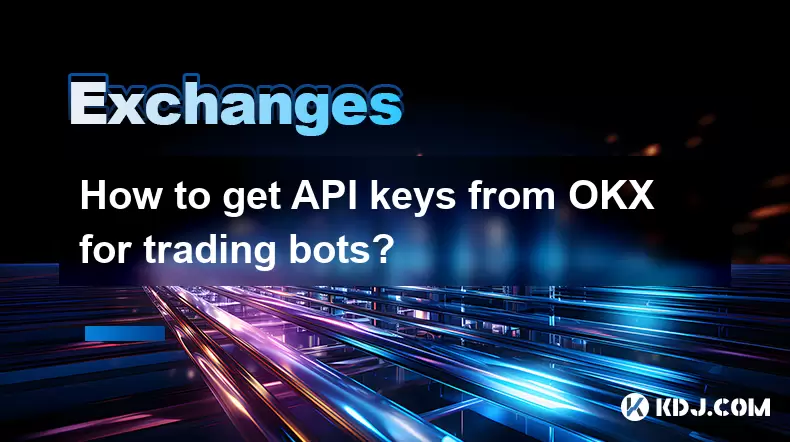
How to get API keys from OKX for trading bots?
Jul 03,2025 at 07:07am
Understanding API Keys on OKXTo interact with the OKX exchange programmatically, especially for building or running trading bots, you need to obtain an API key. An API (Application Programming Interface) key acts as a secure token that allows your bot to communicate with the exchange's servers. On OKX, these keys come with customizable permissions such ...
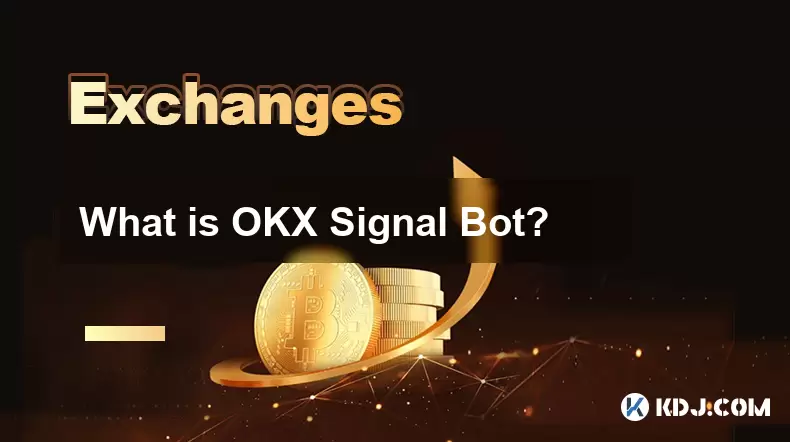
What is OKX Signal Bot?
Jul 02,2025 at 11:01pm
Understanding the Basics of OKX Signal BotThe OKX Signal Bot is a feature within the OKX ecosystem that provides users with automated trading signals and execution capabilities. Designed for both novice and experienced traders, this bot helps identify potential trading opportunities by analyzing market trends, technical indicators, and historical data. ...
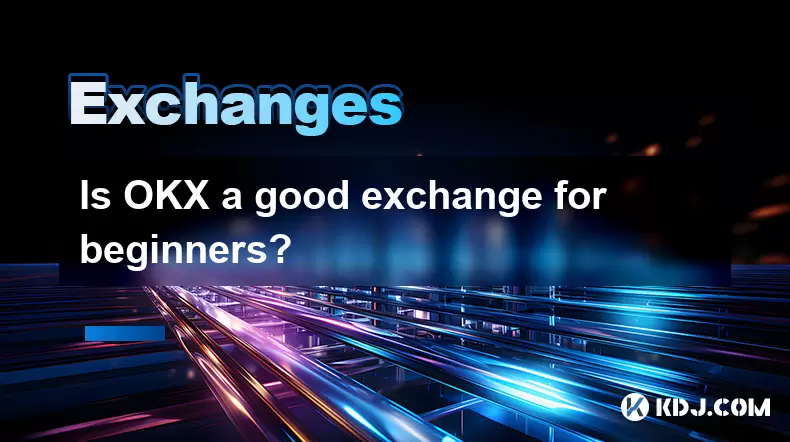
Is OKX a good exchange for beginners?
Jul 03,2025 at 05:00pm
What Is OKX and Why Is It Popular?OKX is one of the leading cryptocurrency exchanges globally, known for its robust trading infrastructure and a wide variety of digital assets available for trading. It supports over 300 cryptocurrencies, including major ones like Bitcoin (BTC), Ethereum (ETH), and Solana (SOL). The platform has gained popularity not onl...
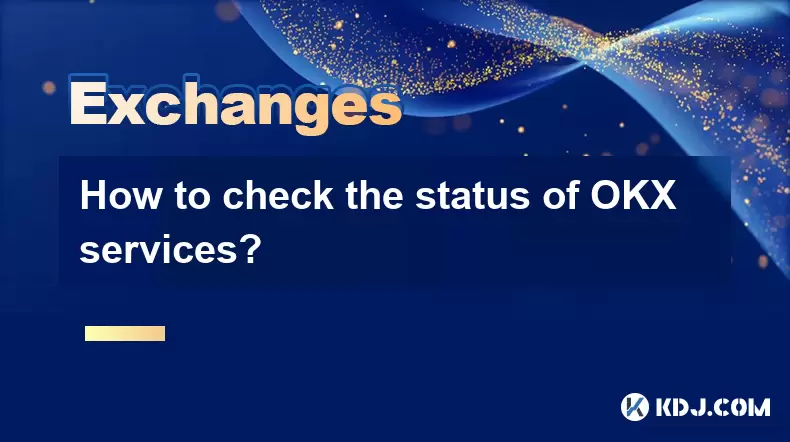
How to check the status of OKX services?
Jul 02,2025 at 11:14pm
What is OKX, and Why Checking Service Status Matters?OKX is one of the world’s leading cryptocurrency exchanges, offering services such as spot trading, futures trading, staking, and more. With millions of users relying on its platform for daily transactions, it's crucial to know how to check the status of OKX services. Downtime or maintenance can affec...
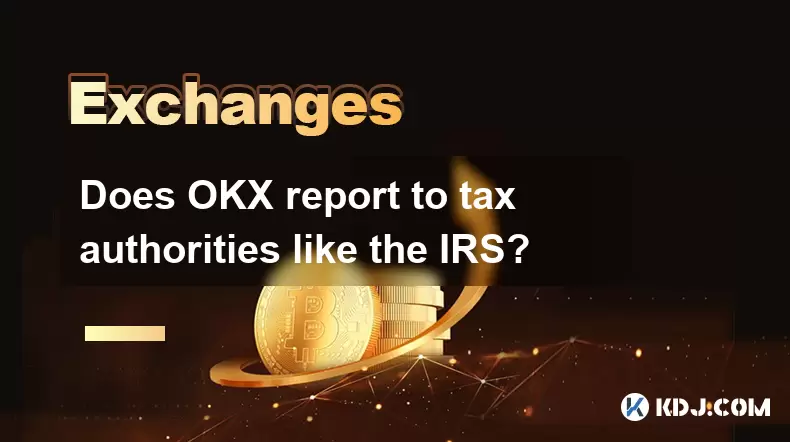
Does OKX report to tax authorities like the IRS?
Jul 03,2025 at 03:14pm
Understanding the Role of Cryptocurrency Exchanges in Tax ReportingCryptocurrency exchanges play a crucial role in facilitating digital asset transactions, but their responsibilities extend beyond trading and custody. As regulatory scrutiny intensifies globally, users are increasingly concerned about whether platforms like OKX report to tax authorities ...
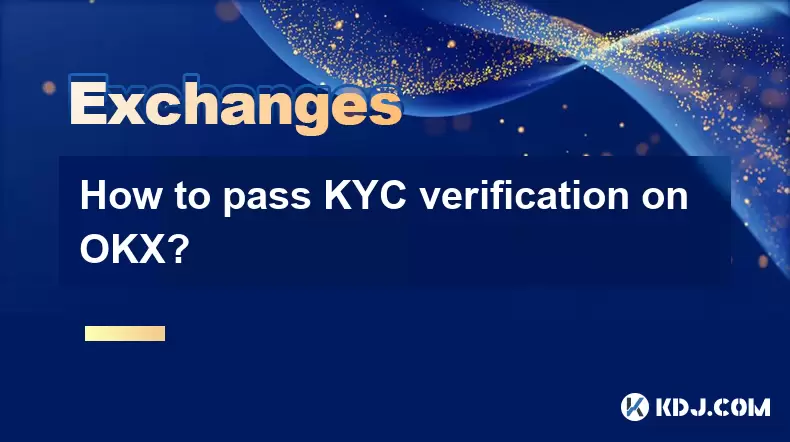
How to pass KYC verification on OKX?
Jul 03,2025 at 01:35am
What Is KYC Verification on OKX?KYC (Know Your Customer) verification is a mandatory process implemented by cryptocurrency exchanges to comply with global financial regulations. On OKX, this procedure ensures that users are who they claim to be, helping prevent fraud, money laundering, and other illicit activities. The KYC process typically involves sub...

How to get API keys from OKX for trading bots?
Jul 03,2025 at 07:07am
Understanding API Keys on OKXTo interact with the OKX exchange programmatically, especially for building or running trading bots, you need to obtain an API key. An API (Application Programming Interface) key acts as a secure token that allows your bot to communicate with the exchange's servers. On OKX, these keys come with customizable permissions such ...

What is OKX Signal Bot?
Jul 02,2025 at 11:01pm
Understanding the Basics of OKX Signal BotThe OKX Signal Bot is a feature within the OKX ecosystem that provides users with automated trading signals and execution capabilities. Designed for both novice and experienced traders, this bot helps identify potential trading opportunities by analyzing market trends, technical indicators, and historical data. ...

Is OKX a good exchange for beginners?
Jul 03,2025 at 05:00pm
What Is OKX and Why Is It Popular?OKX is one of the leading cryptocurrency exchanges globally, known for its robust trading infrastructure and a wide variety of digital assets available for trading. It supports over 300 cryptocurrencies, including major ones like Bitcoin (BTC), Ethereum (ETH), and Solana (SOL). The platform has gained popularity not onl...

How to check the status of OKX services?
Jul 02,2025 at 11:14pm
What is OKX, and Why Checking Service Status Matters?OKX is one of the world’s leading cryptocurrency exchanges, offering services such as spot trading, futures trading, staking, and more. With millions of users relying on its platform for daily transactions, it's crucial to know how to check the status of OKX services. Downtime or maintenance can affec...

Does OKX report to tax authorities like the IRS?
Jul 03,2025 at 03:14pm
Understanding the Role of Cryptocurrency Exchanges in Tax ReportingCryptocurrency exchanges play a crucial role in facilitating digital asset transactions, but their responsibilities extend beyond trading and custody. As regulatory scrutiny intensifies globally, users are increasingly concerned about whether platforms like OKX report to tax authorities ...

How to pass KYC verification on OKX?
Jul 03,2025 at 01:35am
What Is KYC Verification on OKX?KYC (Know Your Customer) verification is a mandatory process implemented by cryptocurrency exchanges to comply with global financial regulations. On OKX, this procedure ensures that users are who they claim to be, helping prevent fraud, money laundering, and other illicit activities. The KYC process typically involves sub...
See all articles





















